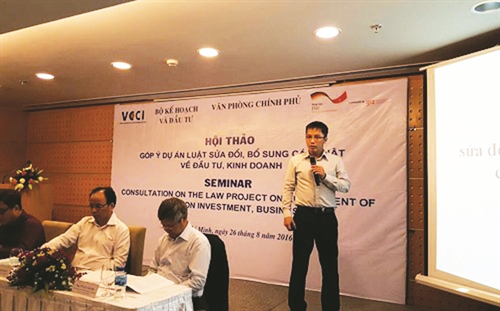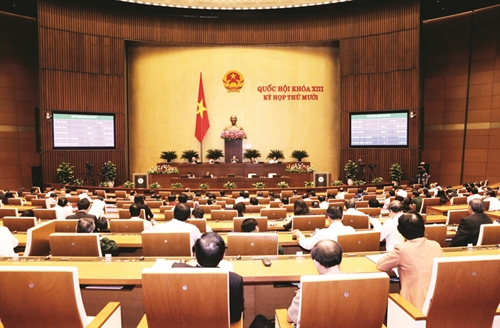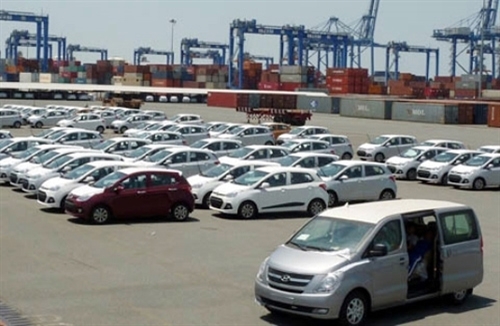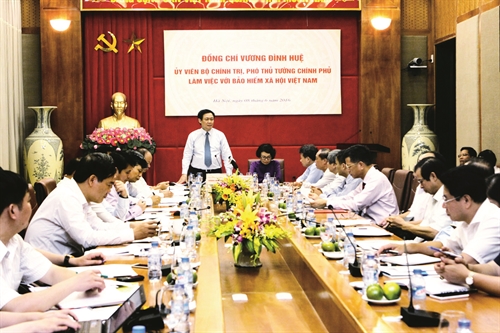The Government Office, the Ministry of Planning and Investment (MPI) and the Vietnam Chamber of Commerce and Industry (VCCI) last month jointly held a seminar in Hanoi to discuss a draft law revising a dozen of laws on business and investment.
According to the draft law unveiled at the seminar, 80 articles of the Investment Law, the Enterprise Law, the Land Law, the Construction Law, the Law on Environmental Protection, the Law on Tax Administration, the Advertisement Law, the Housing Law, the Law on Minerals, the Bidding Law, the Law on Urban Planning and the Law on Cinematography, will be amended or cancelled.
Of these laws, the Investment Law is the most amended one with 30 articles to be revised, followed by the Enterprise Law with 22 articles and the Land Law with 10 articles.
Revisions to the Investment Law
The most notable change to the Investment Law relates to the concept of investment.
Clause 5, Article 3 of the Investment Law stipulates: “business investment means the use of investment capital by an investor to conduct business activities through establishment of economic institutions, contribution of capital to, or purchase of shares or capital contributions at, economic institutions, or investment in the form of contract performance or investment project implementation.”
The draft law proposes amending the above definition by replacing the term “business investment” with “investment”, which is simply defined as “the use of capital being one’s property to do business”. It also adds new provisions specifying “business conditions” and “investment conditions applicable to foreign investors”. Accordingly, “business conditions” refer to conditions that organizations and individuals must satisfy in order to be allowed to do business in a certain conditional business line, while “investment conditions applicable to foreign investors” are conditions on foreign investors as prescribed in laws, ordinances, decrees and treaties on investment.
 |
| Head of VCCI’s Legal Department Dau Anh Tuan presents opinions at the seminar on the draft law revising laws on investment and business held on August 26 in Hanoi __Photo: Internet |
The MPI, the author of the draft law, explains that these changes would create a legal ground for distinguishing business conditions from standards and technical regulations, conditions on social order and safety, etc., thus solving existing problems in the implementation of the Investment Law.
The MPI also says that the proposed revisions to the Investment Law, which mostly concern foreign investors, are designed in the spirit of creating a favorable and level playing field for foreign investors while imposing higher requirements on the quality of the inbound capital flow.
In light of this, the draft law abolishes the provision requiring that before establishing an economic institution in Vietnam, a foreign investor must have an investment project and carry out procedures to apply for an investment registration certificate. However, the MPI still maintains that foreign investors wishing to operate in the country must concurrently possess two types of licenses, namely investment certificate and business registration certificate. It’s high time to tighten the management of the inbound capital flow, according to the MPI.
The current provisions on sectors and trades subject to conditional investment are also amended. Under the draft law, sectors and trades subject to conditional business investment are those in which business investment activities must not only meet certain conditions for the reason of national defense and security, social order and safety, social ethics or community well-being, but also satisfy environmental conditions. Although this new provision imposes higher requirements on business activities, it is extremely necessary, especially when environmental issues in the country have become urgent more than ever.
Regarding incentives for foreign investors, the draft law amends Article 13 of the Investment Law toward guaranteeing the highest incentives for investors. It states that in case a new legal document introduces investment benefits and incentives higher than those currently applied to investors, investors would enjoy the new benefits and incentives for the remaining benefit and incentive enjoyment period of their projects. In case a new legal document introduces investment benefits and incentives lower than those indicated in their investment registration certificates, investors would continue enjoying the benefits and incentives under their investment registration certificates.
However, there remain issues which need further study, Dau Anh Tuan, head of VCCI’s Legal Department, commented.
The first issue is the form of investment registration certificate. Under current regulations, an investment registration certificate is a paper or electronic document recording information on an investment project registered by an investor.
“This is a rigid and inflexible regulation which cannot cover investors’ commitments on taxes, environmental protection, employment, technology, project implementation schedule and so on,” he said.
VCCI therefore proposes replacing investment registration certificates with investment agreements signed between investors and state agencies, in which investors give their commitments on capital, project implementation schedule, production and business lines, environmental protection and planning, etc.
The second matter to be taken into account is the list of sectors and trades subject to conditional investment. Competent state agencies have proposed excluding 68 sectors and trades from the current list of 267 sectors and trades subject to investment conditions, amending 26 others, consolidating 17 sectors and trades with one another, and adding 12 new ones to the list. VCCI goes further to suggest that such list should be a “soft” list to be revised annually by the National Assembly Standing Committee or the National Assembly at the proposal of the Government.
The third issue concerns regulations on investment in the form of public-private partnership (PPP). VCCI argues that current PPP regulations assign too much power to state agencies, from making decisions on which projects will be implemented in the PPP form and which will not to appraising and deciding on detailed contents of projects. This has resulted in a lack of transparency in the implementation of PPP projects, stirring up public worry and posing latent risks to investors.
To remedy the situation, it is suggested that the draft law should add a separate chapter on PPP investment with specific provisions on which projects must be or are encouraged to be or cannot be implemented in the PPP form; procedures and competence to appraise and decide PPP projects; and contents of PPP contracts. Besides, there must be mechanisms to force parties to PPP contracts to make public information relating to their contracts and to empower the public to supervise the performance of PPP contracts.
Amendments to the Enterprise Law
Regarding the establishment of enterprises, Article 3 of the 2014 Enterprise Law stipulates: “In case a specialized law contains particular provisions on the establishment, organization, management, re-organization and dissolution of, and activities related to enterprises, such law must prevail.”
Specialized laws such as the Law on Credit Institutions, the Law on Insurance Business and the Securities Law all contain separate regulations on establishment and dissolution of enterprises, leading to inconsistency in the form of organization of businesses. According to many experts, it would be better if the Enterprise Law would govern only the registration of enterprises established and operating in Vietnam while leaving other issues such as business conditions, rights and obligations of enterprises to be specified in specialized laws.
The draft law now cancels the application of specialized laws in the establishment of enterprises. This means that enterprises would be subject to specialized laws only for matters concerning their organization, management, re-organization, dissolution and operation.
Regarding enterprise representation, the draft law amends Clause 2, Article 13 of the Enterprise Law as follows:
“Limited liability companies and joint stock companies may have one or more than one at-law representative. For a company which has more than one at-law representative, each at-law representative will have all the rights and obligations prescribed in Clause 1 of this Article.”
However, Tuan said that the provision allowing an enterprise to have several representatives can hardly solve problems concerning corporate representation. In reality, big companies often appoint many persons to act as their representatives in transactions with clients and partners. However, these representatives may exploit the loophole in current regulations on “authorization” and “competence” to shirk their responsibilities for any arising matters. The draft law, therefore, should add a provision saying that a person who is not the at-law representative of a company may represent the company only when he is authorized in writing in a power of attorney signed by the at-law representative of the company.
Another debatable matter relates to corporate seals. Clause 4, Article 44 of the current Law states: “The seal shall be used in cases prescribed by law or as agreed by transaction parties.” The draft law amends it into: “The seal shall be used in cases prescribed by law or as agreed by transaction parties. Notices and documents issued or used by the enterprise in enterprise registration must not be necessarily sealed.” As explained by the drafters, such amendment aims to ensure consistency with another provision of the Enterprise Law which allows enterprises to decide to use or not to use a seal. Additionally, the change would facilitate the performance of enterprise registration procedures and step by step reduce the legal validity of corporate seals following the reformatory spirit of the Enterprise Law.
In addition to discussing contents of the draft law, participants in the seminar also made several recommendations on revision of the Enterprise Law.
Tuan, in his capacity as the VCCI’s representative, raised a question about business registration agencies.
“The Enterprise Law mentions the business registration agency 72 times but neither identifies which agency will act as the business registration agency nor determines the organizational apparatus, power and responsibilities of such agency,” he said.
Business registration agencies, at least those in Hanoi and Ho Chi Minh City, should be organized as public non-business units providing business registration services at a reasonable fee, Tuan suggested.
Meanwhile, lawyer Tran Van Tri from the Ho Chi Minh City-based Fujica law firm voiced his worry about the lack of pre-establishment provisions. Although pre-establishment agreements have become more and more common, especially in M&A deals, the current law has no provisions on the legal value of such agreements, leading to difficulties in solving disputes that arise in the pre-establishment period.
Participants in the seminar also made several suggestions concerning land-related rights and obligations of foreign investors.
Under the current Land Law, the transfer of land-use rights to a foreign-invested enterprise is prohibited even after such enterprise obtains an investment decision or investment policy approval from a competent state agency. VCCI proposed the draft law permit foreign-invested enterprises whose investment projects are decided or approved under the investment law to acquire land use rights directly from current land users to implement their projects. Such a provision would help create easier access to land for foreign-invested enterprises instead of offering them the only choice of leasing land directly from the State, the VCCI explained.
Lawyer Truong Anh Duc, a member of the Vietnam Business Lawyer Club, suggested the Land Law be revised to allow foreign investors to directly receive or authorize Vietnam-based banks to receive collaterals being real estate.
Over the past few years, many investors have expressed their interest in buying bad debts of local banks but most of them had to give up their intentions because of the impossibility to buy debts secured by real estate, he said.- (VLLF)








